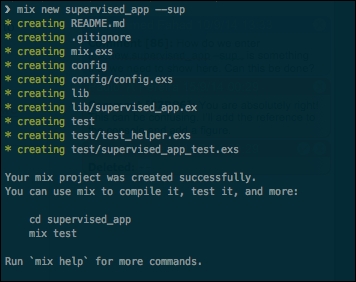Generating a supervised application
An application may be generated with a supervision tree to monitor processes. The supervision tree must be started and stopped with the application, and to do so, an application module callback must also be implemented. Mix provides a simple way to generate this type of application.
How to do it…
To generate an application with a supervision tree and an application module callback, we run mix new supervised_app –-sup in the command line. This is shown in the following screenshot:

How it works…
When mix new task is invoked with the –-sup option, although the generated application appears to be identical to the application created in the Creating a simple application recipe, a few things change, which are as follows:
supervised_app/mix.exs
def application do
[applications: [:logger],
mod: {SupervisedApp, []}]
endAn application module callback is added like this:
supervised_app/lib/supervised_app.ex defmodule SupervisedApp do use Application def start(_type, _args) do import Supervisor.Spec, warn: false children = [ # Define workers and child supervisors to be supervised # worker(SupervisedApp.Worker, [arg1, arg2, arg3]) ] opts = [strategy: :one_for_one, name: SupervisedApp.Supervisor] Supervisor.start_link(children, opts) end end
The Application module behavior is declared, and a start function must be defined to comply with this behavior. Inside the start function, a list of children (usually worker processes) is declared, and so are the supervision options (opts). The supervisor is then started, passing the list of processes to be supervised and the options.
See also
- The documentation for the
Applicationmodule can be accessed at http://elixir-lang.org/docs/stable/elixir/Application.html. - Information on the
Supervisormodule is available at http://elixir-lang.org/docs/stable/elixir/Supervisor.html.
































































